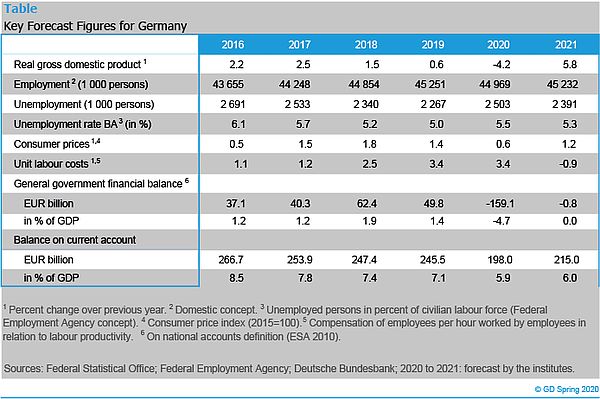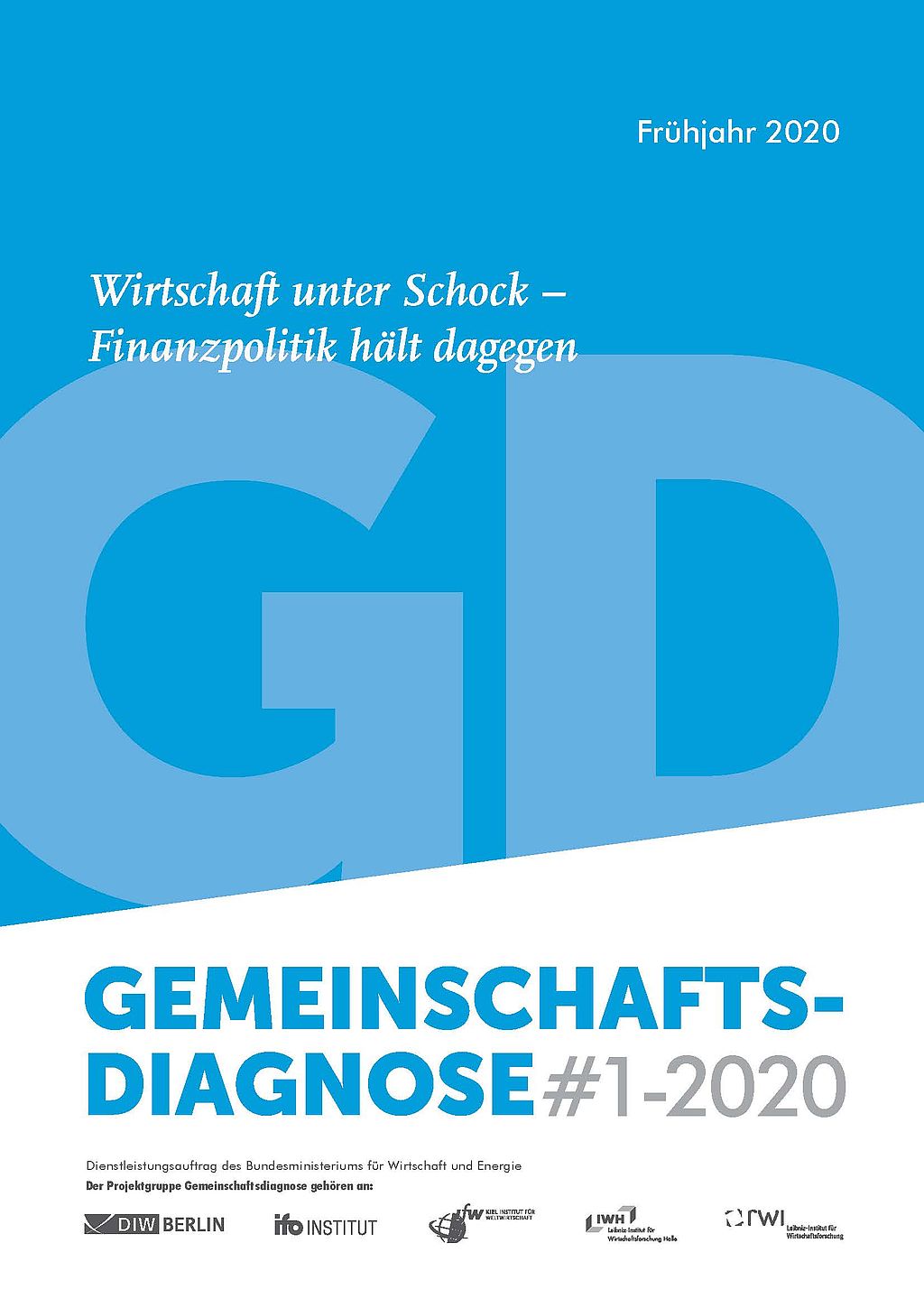Economy in Shock – Fiscal Policy to Counteract
Gross domestic product is likely to have shrunk by 1.9% in the first quarter of 2020 alone. In the second quarter, it will slump by 9.8% as a result of the shutdown. This is the sharpest decline ever recorded in Germany since quarterly national accounts began in 1970; it is also more than twice as steep as the decline during the global financial crisis in the first quarter of 2009.
“The recession is leaving very clear marks on the labor market and the government budget,” says Timo Wollmershäuser, Head of Forecasts at ifo. “At its peak, the unemployment rate will jump to 5.9% this year and the ranks of short-time workers will swell to 2.4 million.” On average, the unemployment figures will rise by almost a quarter of a million to 2.5 million year over year.
“Germany is in a good position to cope with the economic slump and to return in the medium term to the economic level that it would have reached without the crisis,” Wollmershäuser says. Given its favorable financial situation, the government can afford to enact far-reaching measures to cushion the short-term negative consequences for companies and private households. This year, these measures will lead to a record deficit for the general government (federal government, states, municipalities, social security) of EUR 159 billion. General government gross debt is expected to increase to 70% of nominal GDP this year.
The downside risks associated with this forecast are considerable. For instance, the pandemic could abate much more slowly than anticipated. Efforts to restart the economy might also be less than successful and could trigger a new wave of infections. What’s more, additional infection control measures could come into force, which could lead to longer or more extensive production stoppages. This would increase the likelihood of distortions in the financial system as a result of increasing corporate insolvencies that could not be prevented by state support.

The Joint Economic Forecast was prepared by the DIW (Berlin), the ifo Institute (Munich), the IfW (Kiel), the IWH (Halle), and the RWI (Essen).
Full-length version of the report (in German)
Joint Economic Forecast Project Group: Economy in Shock – Fiscal Policy to Counteract, Spring 2020. Munich 2020.
The full-length version of the report (in German language) will be available on the IWH website and at www.gemeinschaftsdiagnose.de/category/gutachten/.
About the Joint Economic Forecast
The Joint Economic Forecast is published twice a year on behalf of the German Federal Ministry for Economic Affairs and Energy. The following institutes participated in the spring report 2020:
- German Institute for Economic Research (DIW Berlin)
- ifo Institute – Leibniz Institute for Economic Research at the University of Munich
in cooperation with the KOF Swiss Economic Institute at ETH Zurich - Kiel Institute for the World Economy (IfW Kiel)
- Halle Institute for Economic Research (IWH) – Member of the Leibniz Association
- RWI – Leibniz Institute for Economic Research in cooperation with the Institute for Advanced Studies Vienna
Scientific Contacts
Dr. Claus Michelsen
German Institute for Economic Research (DIW Berlin)
Tel +49 30 89789 458
CMichelsen@diw.de
Professor Dr. Timo Wollmershäuser
ifo Institute – Leibniz Institute for Economic Research at the University of Munich
Tel +49 89 9224 1406
Wollmershaeuser@ifo.de
Professor Dr. Stefan Kooths
Kiel Institute for the World Economy (IfW Kiel)
Tel +49 341 8814 579 oder +49 30 2067 9664
Stefan.Kooths@ifw-kiel.de
Professor Dr. Oliver Holtemöller
Halle Institute for Economic Research (IWH) – Member of the Leibniz Association
Tel +49 345 7753 800
Oliver.Holtemoeller@iwh-halle.de
Professor Dr. Torsten Schmidt
RWI – Leibniz Institute for Economic Research
Tel +49 201 8149 287
Torsten.Schmidt@rwi-essen.de
Whom to contact
For Researchers

Vice President Department Head
If you have any further questions please contact me.
+49 345 7753-800 Request per E-MailFor Journalists

Press Officer
If you have any further questions please contact me.
+49 345 7753-765 Request per E-MailIWH list of experts
The IWH list of experts provides an overview of IWH research topics and the researchers and scientists in these areas. The relevant experts for the topics listed there can be reached for questions as usual through the IWH Press Office.
Related Publications

Wirtschaft unter Schock – Finanzpolitik hält dagegen: Gemeinschaftsdiagnose Frühjahr 2020
in: Dienstleistungsauftrag des Bundesministeriums für Wirtschaft und Energie, 1, 2020
Abstract
Die Konjunktur in Deutschland bricht als Folge der Corona-Pandemie drastisch ein. Um die Infektionswelle abzubremsen, hat der Staat die wirtschaftliche Aktivität in Deutschland stark eingeschränkt. Deshalb dürfte das Bruttoinlandsprodukt in diesem Jahr um 4,2% schrumpfen. Die Rezession hinterlässt deutliche Spuren auf dem Arbeitsmarkt und im Staatshaushalt. In der Spitze wird die Arbeitslosenquote auf 5,9% und die Zahl der Kurzarbeiter auf 2,4 Millionen hochschnellen. Die finanzpolitischen Stabilisierungsmaßnahmen führen in diesem Jahr zu einem Rekord defizit im gesamtstaatlichen Haushalt von 159 Mrd. Euro. Nach dem Shutdown wird sich die Konjunktur schrittweise erholen. Entsprechend fällt der Anstieg des Bruttoinlandsprodukts im kommenden Jahr mit 5,8% kräftig aus. Mit dieser Prognose sind erhebliche Abwärtsrisiken verbunden, etwa, weil sich die Pandemie deutlich langsamer abschwächen lässt, oder weil das Wiederhochfahren der wirtschaftlichen Aktivität schlechter gelingt als angenommen bzw. eine erneute Ansteckungswelle auslöst.



